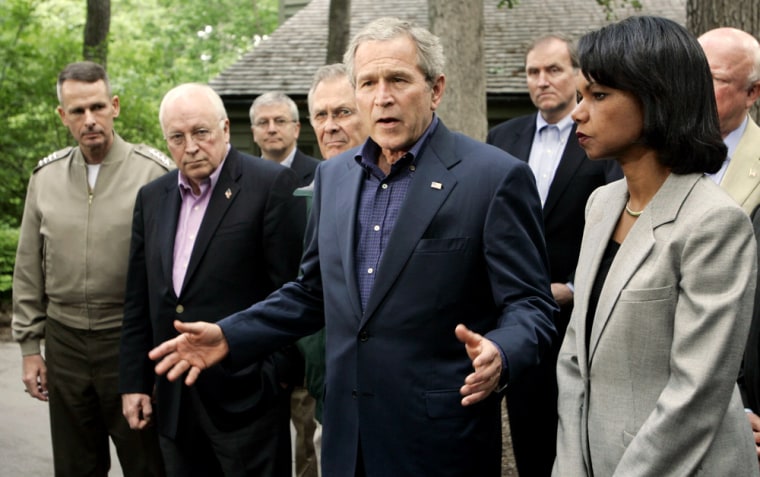President Bush declared Monday to a nation weary of war that democracy in the Middle East is worth the high price to the United States. He also said Iraq’s neighbors should be doing more to help.
Beginning a two-day strategy session on Iraq at Camp David, Bush said nations inside and outside the Middle East have pledged $13 billion for Iraq reconstruction and the United States expects them to back their financial commitments.
“We discussed that today, as to how to continue to rally not only the neighborhood and Iraq’s neighbors to the cause of the new democracy, but how to help others who have made a pledge to honor their pledge,” Bush said.
Senators call for withdrawal plan
Now in its fourth year, the war also was an issue on Capitol Hill.
The Senate opened debate on a military policy bill, and John Kerry, D-Mass., intended to offer a plan to withdraw U.S. combat troops from Iraq by the end of the year. The White House has long opposed setting deadlines in Iraq, and Kerry’s amendment is expected to be defeated when voted on later this week.
Senate Democratic leader Harry Reid said in a speech in Washington that Americans “deserve a plan from the president, one that provides our troops with an exit strategy from this seemingly intractable conflict.” He said, “It is no longer sufficient to say ’we will stand down as the Iraqis stand up.”’
The Camp David meeting came as the Bush administration was trying to capitalize on momentum from last week’s swearing-in of key Iraqi national security officials and from the U.S. airstrike that killed Abu Musab al-Zarqawi, al-Qaida’s leader in Iraq.
‘On our list’
Al-Qaida named a successor Monday to al-Zarqawi and said he would stick to the slain leader’s path — attacks on Shiites as well as on U.S. and Iraqi forces.
“I think the successor to Zarqawi is going to be on our list to bring to justice,” Bush said, standing outside a cabin at the secluded, wooded presidential retreat with his national security team and members of his Cabinet.
“The best way to win this war against an insurgency is to stand up a unity government which is capable of defending itself but also providing tangible benefits to the people,” he said.
The war is weighing down Bush’s approval rating at home, and Republicans are worried about losing control of Congress in November’s midterm elections. Only a third of respondents to an Associated Press-Ipsos poll in early June supported Bush’s handling of the situation — an all-time low.
“I keep reminding the American people that the stakes are worth it,” Bush said. “It is worth it to help Iraq succeed. It is worth it to have a democracy in the Middle East. It is worth it to show other reformers and people who want to live in a free society what is possible.’
Troop drawdown possible
Gen. George Casey, one of the generals who spoke with Bush via teleconference at Camp David, said he thinks it will be possible to withdraw some of the 130,000 U.S. forces in the months ahead as long as Iraq’s government and security forces make progress.
But Bush made no predictions about U.S. troop withdrawals. He said Casey, the top American commander in Iraq, is working to assess the Iraqis’ ability to take the fight to the enemy and secure the country.
“Whatever we do will be based upon the conditions on the ground,” Bush said.
He said he and his advisers discussed the security situation in Iraq, especially in Baghdad and Basra, as well as the Iraqi economy and oil.
Bush suggested that the Iraqi government use the nation’s vast supply of oil as a way to unite the country, perhaps creating a fund for the Iraqi people to restore their faith in the new unified central government.
On Tuesday, Bush is to hold a teleconference with Iraq’s prime minister, Nouri al-Maliki, and members of his cabinet.
The House and Senate are poised to deal with a $94.5 billion measure to fund Iraq and provide additional aid for the hurricane-ravaged Gulf Coast. The bill should receive easy approval, even as impatience is growing to the Iraq war and its $8 billion per month cost.
On Thursday, the House will vote on a resolution supporting the U.S. mission in Iraq.
